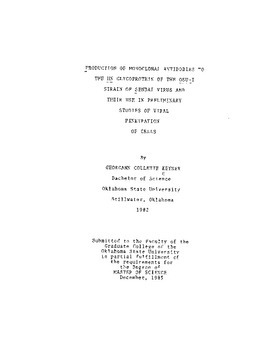| dc.contributor.advisor | Sanborn, Mark R. | |
| dc.contributor.author | Keyser, Georgann Collette | |
| dc.date.accessioned | 2015-09-08T18:12:23Z | |
| dc.date.available | 2015-09-08T18:12:23Z | |
| dc.date.issued | 1985-12-01 | |
| dc.identifier.uri | https://hdl.handle.net/11244/17355 | |
| dc.description.abstract | Hybridoma cells producing monoclonal antibodies to the HN glycoprotein of the OSU-T strain of Sendai virus were developed and used in preliminary antibody blocking assays. Though the actual procedures involved in hybridoma techniques are not difficult, finding precise procedures that would work in our laboratory took time and quite a bit of trial and error. Even when all the procedures are successful, the time from the first immunization of the mice to the time the antibodies are in hand takes at the minimum three to four months. In addition, liposome assays which indicated that Sendai virus perturbs membranes so that molecules as large as an antibody molecule can escape were done. | |
| dc.format | application/pdf | |
| dc.language | en_US | |
| dc.publisher | Oklahoma State University | |
| dc.rights | Copyright is held by the author who has granted the Oklahoma State University Library the non-exclusive right to share this material in its institutional repository. Contact Digital Library Services at lib-dls@okstate.edu or 405-744-9161 for the permission policy on the use, reproduction or distribution of this material. | |
| dc.title | Production Of-Monoclonal Antibodies to the HN Glycoprotein of the Osu-T Strain of Sendai Virus and Their Use in Preliminary Studies of Viral Penetration of Cells | |
| dc.type | text | |
| dc.contributor.committeeMember | Vishniac, Helen S. | |
| dc.contributor.committeeMember | Harmon, James | |
| osu.filename | Thesis-1985-K44p.pdf | |
| osu.accesstype | Open Access | |
| dc.description.department | Microbiology | |
| dc.type.genre | Thesis | |
